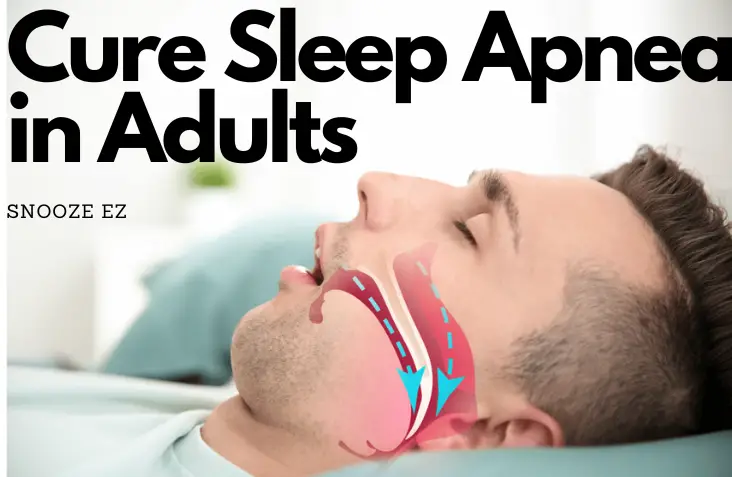How to cure sleep apnea in adults? Sleep apnea generally can not be cured, but there are treatments and practices that can help reverse it.
Most people search this question because they do not want to wear a CPAP mask while they sleep every night. If this is you, you have found the right article.
If not, and you have no issue with wearing a mask, then CPAP masks are proven to treat sleep apnea and help people live long, healthy lives.
I’m Aaron, a sleep expert. We will go over the different treatments and methods of how to possibly cure sleep apnea in adults.
Lifestyle Changes
First, and foremost, there are lifestyle changes you can start implementing now to help reduce the symptoms of sleep apnea.
These are:
Weight loss – many people who are overweight are diagnosed with sleep apnea. If you are overweight, then lose weight by going on a diet.
Exercise – This relates to weight loss, but exercise also helps your overall health. Breathing better and losing more fat in places, like your throat, are the main two.
Alcohol – Only drink alcohol in moderation, if any at all. And if you drink, do not drink before bed! This causes your throat muscles to relax more causing blockage.
Smoking – Smoking causes all sorts of issues including breathing and inflammation in the throat.
Back Sleeping – Try not to sleep on your back. Again, this is a throat thing that makes gravity work against you.
Nasal Passage – Your nasal passage should be clear. If not, use a decongestant or some type of allergy medication that will help your sinuses. You want to avoid sleeping with your mouth open.
Sedatives – Avoid taking these. Sleeping pills and anti-anxiety meds are said to worsen sleep apnea symptoms.
These changes and treatments are your first place to start. When having mild sleep apnea (5-15 breathing episodes a night), implementing the above practices may cure your sleep apnea.
If not cure, then these methods can at least help reduce your symptoms to the point of where you may be able to avoid the use of a cpap mask. If you have moderate to severe sleep apnea, read on.
Moderate to Severe Sleep Apnea Therapies
Besides CPAP (continuous positive airway pressure) machines, there are a few other treatments that your sleep doctor may recommend.
Mouthpiece
There are oral appliances that can be designed specifically for you. This is generally achieved by going to a dentist.
These sleep apnea mouth guards can be made to help jaw movement, reduce blockage in the throat, and even help hold your tongue out of the way.
People with mild, moderate, and even severe sleep apnea have been able to wear these instead of doing CPAP therapy. Check with your doctor and they can help refer you to a dentist.
Surgery
Generally, surgery is only considered when the patient has exhausted all other methods. Though, there are successful surgeries that have helped cure sleep apnea.
Though, keep in mind, sometimes surgery is not a permanent cure/fix. Sleep Apnea has been known to not be resolved by surgery or come back later.
- Tissue Removal – Uvulopalatopharyngoplasty (UPPP) is a procedure where the surgeon will remove excess tissue from your throat to open up your airway more. Sometimes, this includes removing adenoids and tonsils.
- Jaw Placement – Also, called maxillomandibular advancement, is a jaw movement surgery where the upper and lower jaw are both moved forward to further open up the airway
- Nasal Surgery – Sometimes, airways may be obstructed due to nasal passages being crooked or small. A deviated septum can be fixed with surgery and help reduce snoring.
Implant
Upper airway stimulation is a newer implant method to treat sleep apnea. A small device called an impulse generator is implanted under the skin, on the chest area, that sends a signal to the tongue.
This device detects how you breathe, and only when needed, sends the signal. Studies have shown this has greatly improved quality of life and reduces obstruction of the airway.
The most popular company providing this treatment currently is Inspire.
In Closing
Sleep apnea in adults is generally not cured, but rather treated to reduce symptoms. The treatments and methods described above can help any person with sleep apnea reduce their symptoms.
It is possible to cure the problem, though rare. The good news, is there are many ways to live a happy life, including using CPAP treatment. Once accustomed to the mask, many have zero issues using it.
Regardless, do not ignore sleep apnea. Many people currently suffer from sleep apnea and do not even know!
Sleep apnea is proven to reduce life expectancy if left untreated. If you or someone suspect having it, then go see a doctor!


